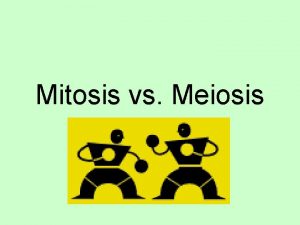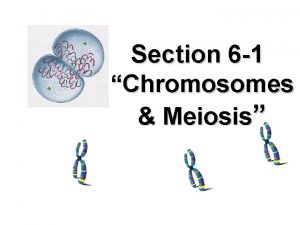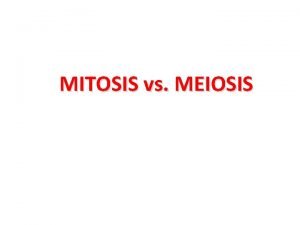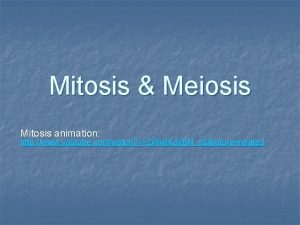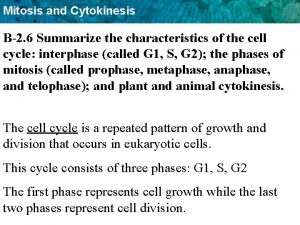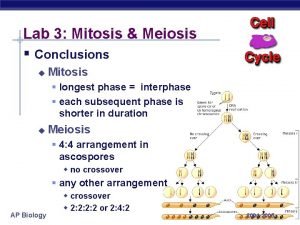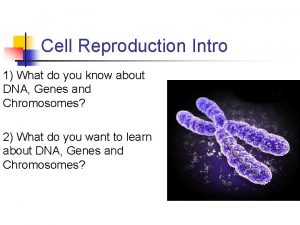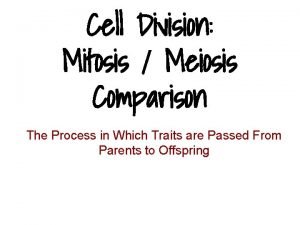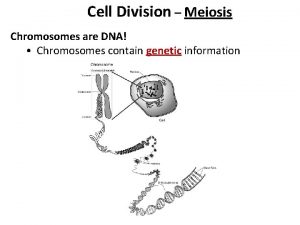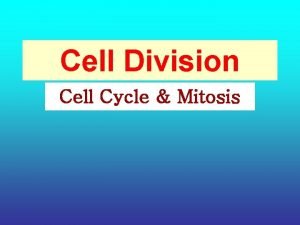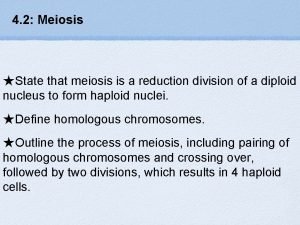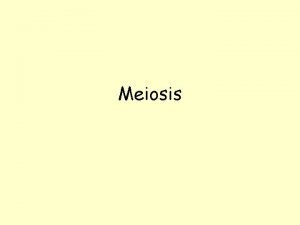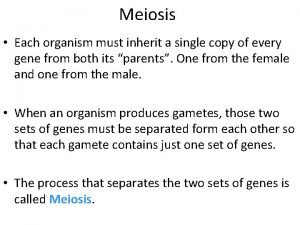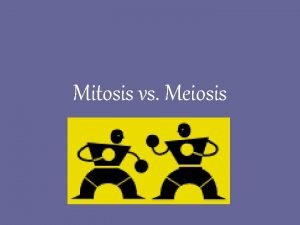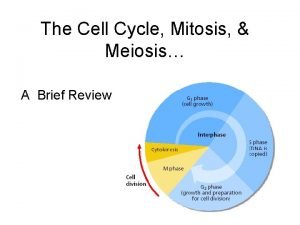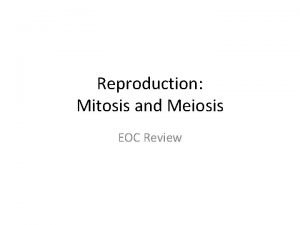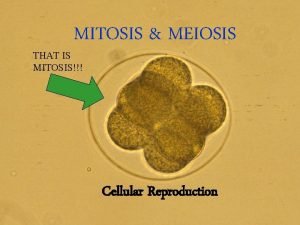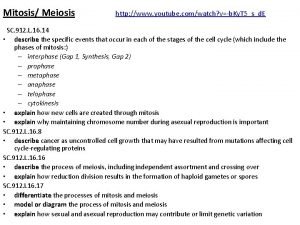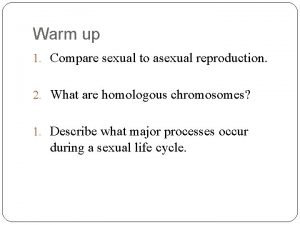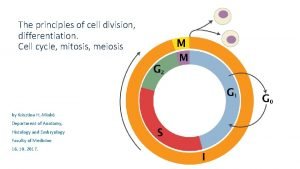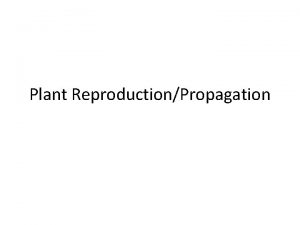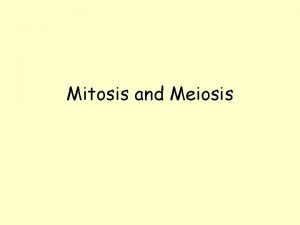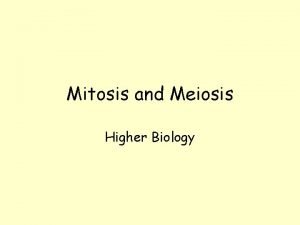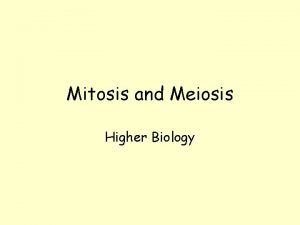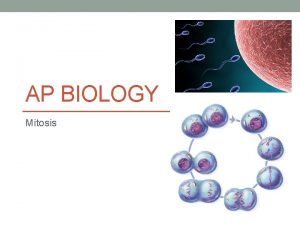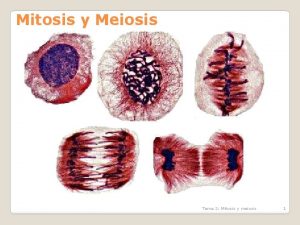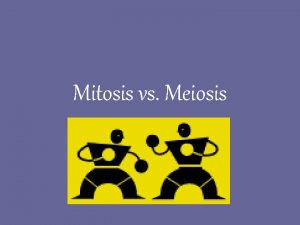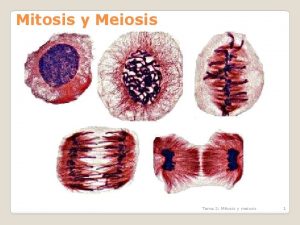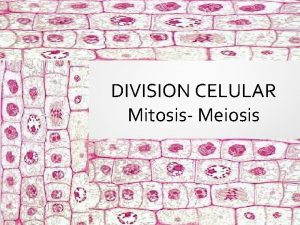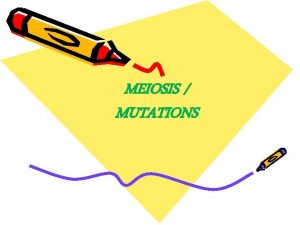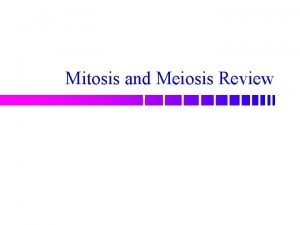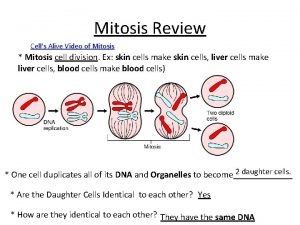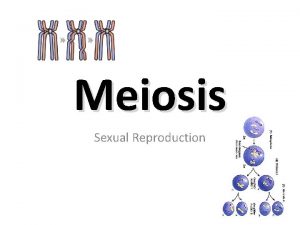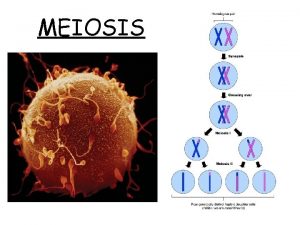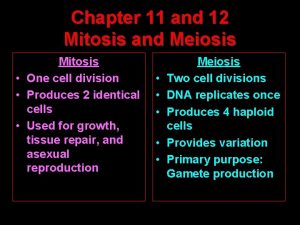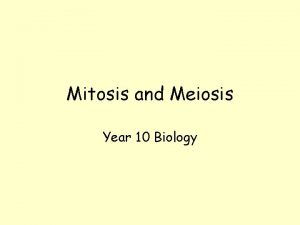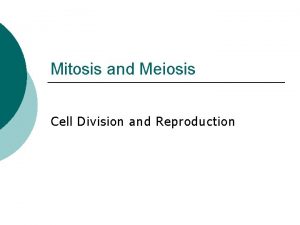Review Meiosis and Mitosis Mitosis or Meiosis 1
































- Slides: 32

Review Meiosis and Mitosis

Mitosis or Meiosis • 1 division

Mitosis or Meiosis • 4 daughter cells produced

Mitosis or Meiosis • Daughter cells different from parent

Mitosis or Meiosis • Asexual reproduction

Mitosis or Meiosis • Duplicates chromosomes

Mitosis or Meiosis • Chromosome # stays same

Mitosis or Meiosis • 2 daughter cells produced

Mitosis or Meiosis • Sexual reproduction

Mitosis or Meiosis • 2 divisions

Mitosis or Meiosis • Chromosome # is halved

Mitosis or Meiosis • Daughter cells identical to parent


Regulating the Cell Cycle

Not all cells move through the cell cycle at the same rate Nerve cells – long lived, most don’t divide Skin cells – every 28 days Cells of Digestive Tract – 2 -5 days Red blood cells – under 120 days, can’t divide Most Muscle cells – long lived, can’t divide

Observing Controlled Cell Growth Few cells When cells come in contact with other cells, they respond by not growing Eventually fill the entire area

Observing Controlled Cell Growth If cells are removed Until the entire space is filled again and then they stop Cells next to the space will begin growing

What did they learn? • Controls on cell growth and cell division can be turned on and off

Healing Process • Cells next to the wound are stimulated to start dividing rapidly

Cell Cycle Regulators • Scientists searched for a substance that would “tell” cells when it was time to duplicate • In early 1980’s they found it

Experiment Sample of cytoplasm is taken from a cell in mitosis It is injected into a new cell in Interphase The new cell begins mitosis The cytoplasm contained certain proteins

Cyclins – proteins that tell the cell when to duplicate Since then we have discovered many different types of cyclins

Internal Regulators • Proteins that respond to events inside the cell Makes sure cell doesn’t enter mitosis until all the chromosomes have replicated Prevents cell from going into Anaphase until all the chromosomes are attached to mitotic spindles

External Regulators • Proteins that respond to events outside the cell Growth hormones that tell cells to start growing – embryonic development Wound healing process Molecules on neighboring cells are slowed down to prevent excess cell growth in the area

What happens if cell growth isn’t regulated?

• Cancer cells do not respond to the signals that regulate the growth of most cells. As a result, they form masses of cells called tumors that can damage the surrounding tissues.


Cancer – abnormal growth of cells –Benign (kindly) – grow slowly, push around cells, localized –Malignant (bad) – grow quickly, invade other cells, and travel


What causes cells to lose control over growth? • radiation • trauma • certain viral infections • chemicals (tobacco tars) :

Curing Cancer? • Cancer is a disease of the cell cycle, and conquering cancer will require a much deeper understanding of the processes that control cell division.

• Why study cells? • Why is understanding cell division important?
 Mitosis and meiosis reflection
Mitosis and meiosis reflection Parthenogenesis asexual reproduction
Parthenogenesis asexual reproduction Mitosis meiosis
Mitosis meiosis Whats the difference between mitosis and meiosis
Whats the difference between mitosis and meiosis Kesler science atoms answer key
Kesler science atoms answer key Haploid vs diploid venn diagram
Haploid vs diploid venn diagram Cell division concept map
Cell division concept map Mitosis and meiosis youtube
Mitosis and meiosis youtube Mitosis purpose
Mitosis purpose Mitosis and meiosis escape room answer key
Mitosis and meiosis escape room answer key Respirometer
Respirometer Meiosis flipbook
Meiosis flipbook Asexual and sexual reproduction venn diagram
Asexual and sexual reproduction venn diagram Chromosome sets (=n) in mitosis and meiosis
Chromosome sets (=n) in mitosis and meiosis Characteristics of mitosis and meiosis
Characteristics of mitosis and meiosis Mitosis and meiosis
Mitosis and meiosis Crossing over in meiosis and mitosis
Crossing over in meiosis and mitosis Chromosome sets (=n) in mitosis and meiosis
Chromosome sets (=n) in mitosis and meiosis Differentiate between chromosome and chromatid
Differentiate between chromosome and chromatid Cell division mitosis and meiosis
Cell division mitosis and meiosis Diploid to haploid meiosis
Diploid to haploid meiosis Tetrad meiosis
Tetrad meiosis Mitosis vs meiosis double bubble compare and contrast
Mitosis vs meiosis double bubble compare and contrast Mitosis and meiosis jeopardy
Mitosis and meiosis jeopardy Meiosis and mitosis images
Meiosis and mitosis images Prophase cell cycle
Prophase cell cycle Mitosis and meiosis
Mitosis and meiosis Mitosis and meiosis
Mitosis and meiosis Mitosis and meiosis
Mitosis and meiosis Independent assortment in meiosis
Independent assortment in meiosis Two types of reproduction
Two types of reproduction Diploten
Diploten Importance of mitosis
Importance of mitosis
